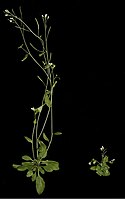
Photo from wikipedia
Thousands of lncRNAs with ecotype-specific expression, including two that likely regulate primary root growth, are potentially linked to the evolution of regulatory mechanisms among ecotypes. Root architecture varies widely between… Click to show full abstract
Thousands of lncRNAs with ecotype-specific expression, including two that likely regulate primary root growth, are potentially linked to the evolution of regulatory mechanisms among ecotypes. Root architecture varies widely between species; it even varies between ecotypes of the same species, despite strong conservation of the coding portion of their genomes. By contrast, noncoding RNAs evolve rapidly between ecotypes and may control their differential responses to the environment, since several long noncoding RNAs (lncRNAs) are known to quantitatively regulate gene expression. Roots from ecotypes Columbia and Landsberg erecta of Arabidopsis (Arabidopsis thaliana) respond differently to phosphate starvation. Here, we compared transcriptomes (mRNAs, lncRNAs, and small RNAs) of root tips from these two ecotypes during early phosphate starvation. We identified thousands of lncRNAs that were largely conserved at the DNA level in these ecotypes. In contrast to coding genes, many lncRNAs were specifically transcribed in one ecotype and/or differentially expressed between ecotypes independent of phosphate availability. We further characterized these ecotype-related lncRNAs and studied their link with small interfering RNAs. Our analysis identified 675 lncRNAs differentially expressed between the two ecotypes, including antisense RNAs targeting key regulators of root-growth responses. Misregulation of several lincRNAs showed that at least two ecotype-related lncRNAs regulate primary root growth in ecotype Columbia. RNA-sequencing analysis following deregulation of lncRNA NPC48 revealed a potential link with root growth and transport functions. This exploration of the noncoding transcriptome identified ecotype-specific lncRNA-mediated regulation in root apexes. The noncoding genome may harbor further mechanisms involved in ecotype adaptation of roots to different soil environments.
Journal Title: Plant Physiology
Year Published: 2020
Link to full text (if available)
Share on Social Media: Sign Up to like & get
recommendations!